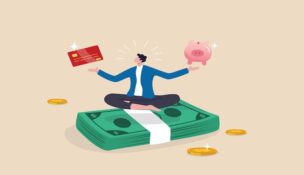How to Stop Stressing About Money
Is money the root of all evil?
Lauren Miller //September 9, 2019//


How to Stop Stressing About Money
Is money the root of all evil?
Lauren Miller //September 9, 2019//

Across the board, money continues to pop up as one of the biggest perpetrators of stress and anxiety. More often, it’s usually around the lack of it than it is too much of it; however, anxiety disorders have appeared in the presence of financial abundance, particularly when the attachment to it spills over into the identity of the person.
It has been said of money that it is the root of all evil. Perhaps the truth behind this statement lies in the experience of attachment and identity, which surrounds our every interaction with money.
An attachment is an emotional state of clinging due to the belief that without some thing, person or circumstance one cannot be happy. It is a vicious cycle, which creates unwanted fear and anxiety. As soon as one gets that which one desires, the fear of losing it quickly slithers into the mental radar often wreaking havoc on any chance at a good nights rest.
When we give power to anything outside what we believe we are capable of handling, we render ourselves extremely vulnerable to rising and falling depending upon our outside circumstance, including the presence or absence of money. Studies continue to reveal that happiness and lack of stress occurs when one can maintain an inner confidence in one’s ability to find solutions to life’s challenges.
Some of the most incredible examples of happiness can be found in cultures who have very little money and monetary worries. Instead, the art of simplicity and focusing on the essentials occupies these cultures. Perhaps it is worth our attention to explore the statement: less is more.
The pursuit for material gain, and its connection to our sense of worth and value, has created the behavior which fuels the stress associated with money: greed, envy, lack of self-control. All three of these attributes are likened to a spoiled child: the more you give into its demands, the more it wants.
Greed. When is enough, enough? The more you feed it the more it wants. It overrides the moral compass again and again in its ruthless pursuit for momentary hits of satisfaction due to personal gain, often at the expense of others.
Greed has many different shadows, often working under the radar of the moral compass and often involving the element of money: greed for attention, approval, affection, fame, position, popularity.
Envy. Wishing that you had what someone else has. Envy too shows up in disguise: gossip, judgment and ugly talk; feelings of embarrassment; thoughts of lack, less than, negative self talk fueled by feelings of unworthiness and lack of value; buying things against your better judgment to keep up with those around you; fits of jealousy and anger, due to the fear that someone will take what you feel is rightfully yours: promotion; relationship; fame.
Now we come to an attribute, which when practiced holds the key to your freedom. The lack of self-control as mentioned fuels stress and anxiety around money.
Self-control is the ability to delay gratification. Self-control is impulse control, which is often seen fleeing the scene of an over spending frenzy. It takes approximately 30 days to anchor a new behavior into the neurology of your brain. Current theory suggests anchoring the new desired behavior to a habit you already have.
For example, let’s say you are in the habit of walking or driving down a road where you encounter people who are homeless. You want to expand generosity in your life. On the weekend put together a few bags with an apple, granola bar, water, socks and a card that says, "I see you and you matter."
Generosity produces endorphins, which reduce the stress hormone. Our greatest experience of joy is in the measure through which we give of our talent, treasure and time to those in need.
Can you imagine how much money you could save, give and spend from an intelligent space by simply expanding your ability to control your money impulses fueled by greed and envy? The cool thing about the attribute of self-control is that the more you practice it, the easier it becomes.
So the next time you feel the urge to spend over your higher intelligence ̶ which knows you are already living in debt ̶ pause, take a deep breath and ask yourself: What do I need to remember in order to make a healthy choice in this situation? Perhaps it’s that you are enough, with or without this item or experience.
Being a good steward of financial gain in life requires a balance between giving, spending and saving all of which require the attribute of self-control for the greater good of all concerned.
Come up with a little mantra that you can use to override unhealthy financial impulses. The one I use is, "Give some, save some, spend some. Balance is essential for inner peace and purpose."

























